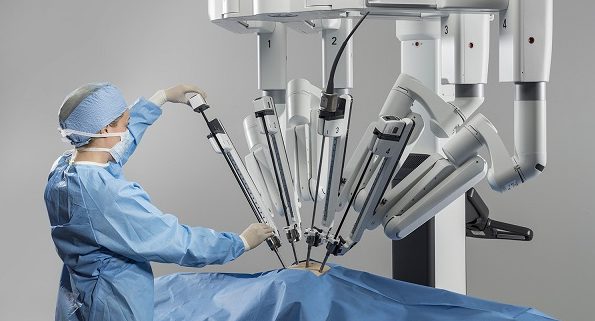Medical device and MedTech insights, news, tips and more
Intuitive Surgical Exec: Here Is Why Robotic Surgery Is Useful
August 8, 2016

Dr. Catherine Mohr, senior director of medical research at Intuitive Surgical.
Intuitive Surgical is the maker of the Da Vinci Surgical System, a robot used in prostate removal and other surgical procedures. There, Dr. Mohr develops new surgical procedures and evaluates new technologies for improving surgical outcomes. She submitted this piece in response to a post by Forbes contributor Robert Pearl, who is the chief executive of the Permanente Medical Group. I continue to think Pearl wrote a thoughtful post, but he did not give enough opportunity for defenders of robotic surgery to state their case. That opportunity is therefore given here. (Matthew HerperFORBES STAFF)

As a doctor and engineer who has dedicated myself to developing new and better ways to perform medical procedures around the world, I have seen firsthand how minimally invasive robotic-assisted surgery has revolutionized the field of surgery. I have also directly experienced the value it can bring to both surgeons and patients.
Disruptive technology such as robotics naturally breeds skeptics. This is a good thing, as every new medical technology should earn its way into practice by either improving outcomes or reducing cost (ideally both). However, skepticism without an understanding of a technology or how it is applied hinders medical progress and does not help improve patient care. A Forbes contributor recently called into question the value of robotic-assisted surgery compared with other surgical techniques, first asserting it had no benefit, then implying that surgeons using this technology were dupes of a marketing campaign before concluding that the only role of robotics was to drive up cost. (See: America’s Broken Health Care System) The published scientific literature shows something very different.
Critics often cite studies that show that laparoscopy (a manual method for performing minimally invasive surgery) and robotic-assisted surgery share similar outcomes, while citing lower costs associated with laparoscopy. They then ask rhetorically, “why do we need robotics?” The answer is simple: Because robotic-assisted surgery replaces open surgery, and in doing so, it increases the overall number of minimally invasive surgeries, improves outcomes and drives down cost. Looking at prostatectomy specifically, as the contributor did, the data from a vast majority of the more than 1,600 peer-reviewed robotic-assisted prostatectomy studies consistently show that da Vinci surgery – a robotic-assisted approach – results in fewer complications, shorter length of hospital stay, a trend toward lower mortality and a trend toward more effective removal of cancer when compared with open surgery.
This comparison is an important one to make. Prior to the introduction of robotic-assisted surgery, nearly all prostatectomies – about 95 percent – were performed with an open incision. Minimally invasive surgery was simply not an option for most men needing a prostatectomy, even though laparoscopy had been available and in regular use for other types of surgery for more than 10 years before the robotic-assisted approach became available in 2001. That year, very few prostatectomies were being done minimally invasively because it is a technically demanding surgery that is very difficult to perform laparoscopically. In contrast, today more than 85 percent of the prostatectomies performed in the United States are done minimally invasively, with robotic assistance. Robotics has had a profound effect on the patient experience for this surgery.
A surgeon’s goal for each patient should be minimally invasive surgery whenever possible. One important aspect in this debate that skeptics often ignore is that use of the da Vinci Surgical System is compatible with, and complementary to, laparoscopy. If laparoscopy is available or feasible for a particular patient, the surgery should be performed laparoscopically. But, where laparoscopy isn’t feasible or appropriate for a particular patient, a surgeon may use the da Vinci Surgical System to offer that patient a minimally invasive option – and a chance at a faster return to their daily activities.
Read Full Article – Source: Intuitive Surgical Exec: Here Is Why Robotic Surgery Is Useful – Forbes
Author – Matthew Herper, Guest Post by Dr. Catherine Mohr
